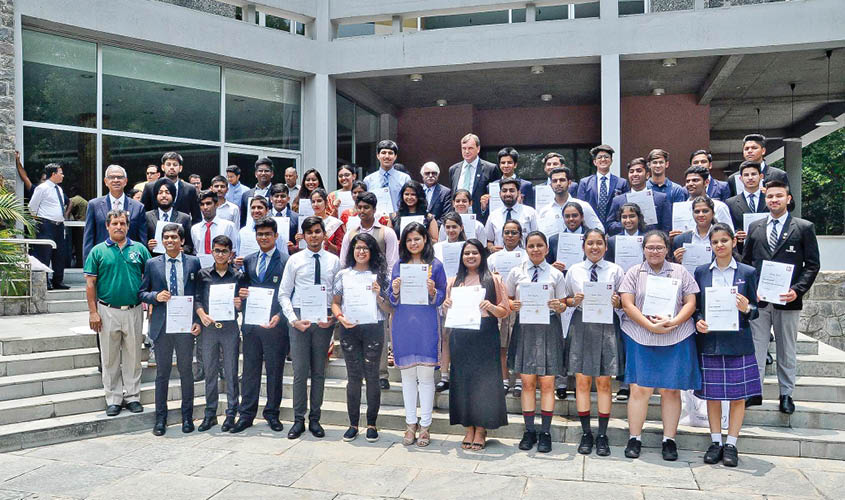The Duke of Edinburgh International Award started its Indian chapter, the IAYP, in 1962 to promote young leaders. Over 50 such youngsters received the IAYP award earlier this week in Delhi.
A total of 56 young people from across the country received the “Gold Award” at an event organised by the International Award for Young People (IAYP) on 10 July at the India International Centre in New Delhi. The award was presented by Sir Dominic Asquith, the British High Commissioner to India.
The IAYP is an Indian branch of The Duke of Edinburgh’s International Award, which is a youth development programme that works towards empowering the young people at various locations globally. The programme in India endeavours to inspire the youth, in the age bracket of 14-24 years, through a non-formal education framework, which challenges them and helps them discover their complete potential and celebrate
their achievements.
There are three levels of the award—Bronze, Silver and Gold. All the three levels have a minimum age and minimum time commitment criterion for participation. You can participate in the Bronze level only if you are 14 years old and willing to commit a time period of at least six months. For the Silver level, the minimum age of 15 years and a minimum time period of six months is required. Gold level is open for volunteers who are above 16 years and can commit at least 18 months. However, exemptions in the time period are made if you are a Bronze Award holder (and want to participate in the Silver level), and Silver Award holder (if you have enrolled in the Gold level).
Young people who enroll themselves in these levels are free to set their own challenges in areas such as service to community; skills that develop their personal interests and practical knowledge; physical recreation that also involves fitness; undertaking an experiential adventurous journey; and helping in setting up residential projects (exclusive to the Gold level participants).
For each level, the participants need to dedicate themselves in regular activities and commit at least an hour in a week to these activities. The qualifying standards are measured in terms of progress, proficiency and sustained efforts.
Sir Dominic Asquith, during the award distribution ceremony in Delhi, said, “It has been a great honour to meet such a dynamic group of young people today, and to hear about their award journeys. Achieving a Gold Award is no small feat. It requires commitment, resilience and enthusiasm—something these awardees have in spades. I am sure that this will be just the first exciting step in a long journey
of achievement.”
In India, the IAYP has established partnerships with NGOs that work with marginalised youths, rural and urban migrants, communities facing economic and social challenges, and young people with special needs. It has a strong commitment to work with young people who are considered at risk or marginalised. The programme each year ensures that at least 20% of all enrolment encompasses young people from these backgrounds.
Kapil Bhalla, National Director of the IAYP, said, “The Award helps India’s young people to challenge themselves, experience life and find their purpose, passion and place in the world. The Gold Award challenges participants over 18 months and more, in five areas—physical activity, skill development, service to the community, residential project. And by taking them outside of their comfort zone, through an adventurous journey.”

The youth award, which promotes experiential learning through individual challenges, was first introduced in India in 1962 and has since then imparted new skills to over 100,000 young people. In 2017 alone, more than 42,000 participants in India got enrolled the award programme.
The global programme—The Duke of Edinburgh’s International Award—was launched in 1956 by the Duke of Edinburgh Lord Hunt and Dr Kurt Hahn. In more than 60 years since its inception, the programme has been able to transform the lives of more than eight million young people.
The International Award Association comprises 71 National Award operations and more than 200 independent operators in more than
140 countries.
The Indian board of trustees include Himmat Sher Singh Kalsia, Dr Sanat Kaul, Rakesh Bharti Mittal, Arunachalam Vellayan, Dr S.Y. Quraishi and Rajan Ray.
Young people from any background can volunteer for the programme and can enroll themselves in any of the three award levels by paying a nominal fee of
Rs 700.
Each participant gets a mentor who keeps a close eye on his or her performance, and helps them in achieving the set goals. Since most of these participants are school-going children, their mentors usually are their teachers who are experts in the area the participant intends to engage in. In addition to school-going children, youngsters who are interested in enrolling for the programme can directly reach out to IAYP’s national office in New Delhi.
Pallavi Gill has volunteered for all the three levels and has won Gold, Silver and Bronze awards in the years 2013, 2011 and 2010 respectively. On her experience of participating in the programme, she told us, “I enrolled in the award when I was in class IX. I went on to win the Bronze, Silver and Gold… The award teaches you qualities that are immeasurable, such as perseverance, hard work, time management, confidence etc. The award teaches us to never give up and challenge ourselves to be the best that we can be.”
For more information on IAYP, visit www.iayp.in

